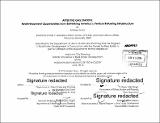After the gas station : redevelopment opportunities from rethinking America's vehicle refueling infrastructure
Author(s)
Turco, Andrew
DownloadFull printable version (11.87Mb)
Other Contributors
Massachusetts Institute of Technology. Center for Real Estate. Program in Real Estate Development.
Advisor
Alan Berger.
Terms of use
Metadata
Show full item recordAbstract
Gas stations are found throughout the US, but their ubiquity causes them to go largely unnoticed. Because their purpose - refueling vehicles - is so uniform and so integral to the existing automotive transportation system, stations share extensive siting and design similarities across many contexts. Recent corporate, market, and regulatory pressures have led to the closure of tens of thousands of these stations in the past few decades. Increasingly stringent Corporate Average Fuel Economy (CAFE) standards will likely continue the trend of station closures. CAFE standards are expected to reduce future US gasoline consumption and spur the production of alternative powertrain vehicles. Of these new powertrain technologies, electric vehicles (EVs) demand particular attention because their introduction has been quite strong and because their adoption has the potential to significantly change the location and physical environment in which vehicles are "refueled." EVs differ from other propulsion systems in that they rely on electricity for power. Unlike liquid fuels, which are most efficiently distributed from centralized facilities, electric power can be obtained from a number of dispersed outlets. This thesis seeks to rethink the physical infrastructure that is and has been necessary to fuel the US's vehicles by exploring the most effective deployment of EV charging systems and by proposing potential reuses for unneeded gas station sites. After studying vehicle travel patterns and EV charging requirements, at-home suburban charging systems emerge as the most effective way to support electric vehicles. In addition to the environmental benefits to the transportation system, solar and smart-meter components of this charging system enable the greening of the power grid as well. As such, this thesis posits that the most effective deployment of EVs and their associated chargers would be in suburban areas that currently have dirty energy profiles and high solar capacity. Another promising place for EV charger deployment would be at centralized stations along major transportation routes that could be co-located with uses that actively take advantage of the extended time it takes to recharge an EV battery. Especially in EV target regions, reduced demand for gasoline can be expected to further unlock opportunities for gas station property redevelopment. Challenges to reuse include environmental remediation costs and liabilities, but this thesis explores strategies for overcoming these obstacles, as well as redevelopment functions that take advantage of gas stations' small and distributed characteristics
Description
Thesis: M.C.P., Massachusetts Institute of Technology, Department of Urban Studies and Planning, 2014. Thesis: S.M. in Real Estate Development, Massachusetts Institute of Technology, Program in Real Estate Development in conjunction with the Center for Real Estate, 2014.. Page 93 blank. Cataloged from PDF version of thesis. Includes bibliographical references (pages 89-92).
Date issued
2014Department
Massachusetts Institute of Technology. Center for Real Estate. Program in Real Estate Development.; Massachusetts Institute of Technology. Center for Real Estate; Massachusetts Institute of Technology. Department of Urban Studies and PlanningPublisher
Massachusetts Institute of Technology
Keywords
Urban Studies and Planning., Center for Real Estate. Program in Real Estate Development.